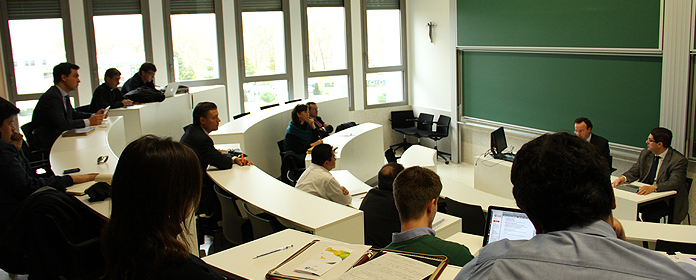Eight highlights of Institute for Culture and Society 's activities between April and June 2015
The IV training course of Teachers of Palliative Care, the workshop Interdisciplinary Family, the IV Development Week, a congress and three international workshops, and three sessions of the III Ethics & Society Forum will be held.

The Institute for Culture and Society (ICS) will hold several highlights between April and June 2015. These include three sessions of the III Ethics & Society Forum, the IV training course of Teachers of Palliative Care, organized by the ATLANTES Program; the workshop Interdisciplinary Family, coordinated by the ICS on the initiative of Office of the Vice President for Research; two international workshops of the projects 'Emotional culture and identity', 'Public discourse' and 'Natural Law and Rationality internship'; the IV Development Week of the Navarra Center for International Development and an internationalcongress of the project 'Religion and Civil Society'.
1. SPRING SESSIONS OF THE III ETHICS & SOCIETY FORUM (23/04, 07/05 and 25/05/2015).
The Ethics and Society Forum has as goal to address issues related to the improvement of communal life and society, both from the perspective of ethics and legal theory. Three sessions are planned for April and May: 'Civilization and Violence in the Sociology of Norbert Elias', at position by Alejandro García Martínez, researcher of project 'Emotional culture and identity'; 'Critical Discourse Interventions of Public Intellectuals as Counter-hegemonic Strategies', to be given by Jan Zienkowski, researcher of project 'Public discourse'; and 'Space of Appearance and Action: Politics in the Work of Hannah Arendt', topic to be given by Julia Urabayen, researcher at project 'Natural Law and Rationality internship'. + info
2. FOURTH SPANISH EDITION OF training BASIC COURSE FOR PALLIATIVE CARE TEACHERS (15-18/04/2015).
This intensive basic course is based on 20 years of international experience. Since its first edition, it has been held in more than 15 countries and has been attended by students of more than 20 nationalities. It is backed by the experience professor of the University of Navarra, which has specific courses on palliative care at Degree and postgraduate program. + info
3. workshop INTERDISCIPLINARY FAMILY (24/04/2015)
Its goal is to create a point of meeting for researchers at the University of Navarra who address issues related to family and society from all disciplines. + info
4. 'SHARING PRACTICES, EMOTIONAL WORK AND EMERGENT EFFECTS OF SOCIABILITY' (05/05/2015).
Emmanuela Mora, professor at the Università Cattolica del Sacro Cuore in Milan (Italy), organizes this international workshop of project 'Emotional culture and identity'. It will focus on the 'Economics shared ', a subject of practices apparently based on different forms of sharing that take place in the area of consumption, as well as in production and participation. + info
5. 'MIND, MEANING AND MULTIMODALITY' (14-15/05/2015).
This international workshop organized by the project 'Discruso público' will bring together scholars from the fields of Multimodality and Expression from different perspectives: Pragmatics, Semantics, Analysis of speech, Semiotics, Computational Linguistics, Expression Studies, Cognitive Sciences, Computer Sciences, etc. + info
6. 'Philosophy TRANSCENDENTAL, PHENOMENOLOGY AND NATURAL LAW' (19-20/05/2015).
This is an initiative of project 'Natural Law and Rationality internship'.
7. IV DEVELOPMENT WEEK (1-4/06/2015)
The novelty of this edition is that it will be held in Madrid. On the 1st a workshop on 'Human Capital and Development' will be held and on the 2nd it will focus on 'Macroeconomic Stability in Developing Countries'. Some of the confirmed speakers are Jere Behrman (University of Pennsylvania) and Sebastian Edwards (University of California, Los Angeles). + info
8. 'RELIGIOUS TOLERATION IN THE AGE OF ENLIGHTENMENT (1650-1800): HISTORICAL PERSPECTIVES ON CURRENT DEBATES' (22-23/06/2015).
This international congress , organized by the project 'Religion and Civil Society', will address two main lines. The first is to trace the many Enlightenment legacies present in dominant discourses on religion and freedom. The second is to reconsider existing narratives about the place of the Enlightenment in the history of tolerance. + info
